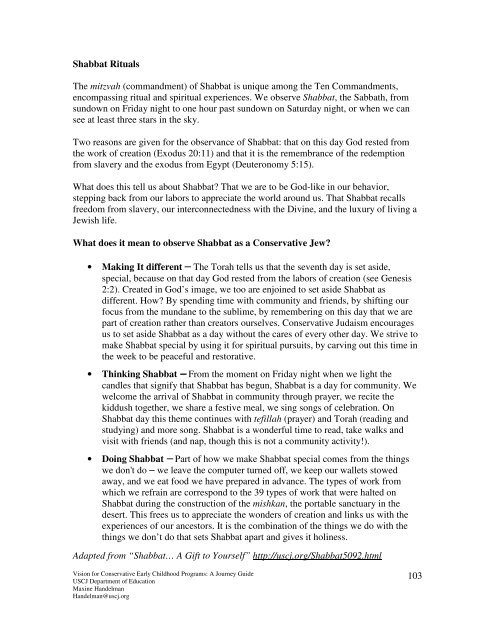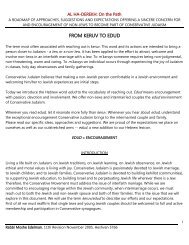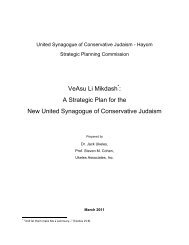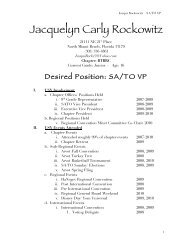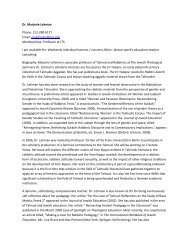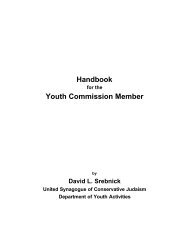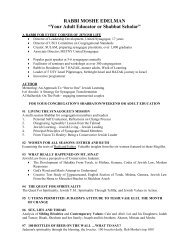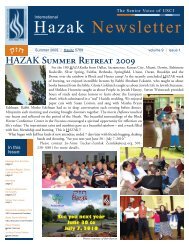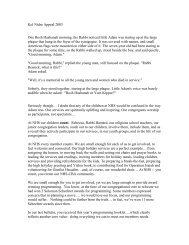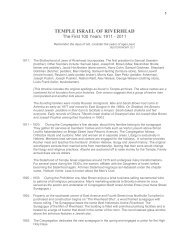Vision for Conservative Early Childhood Programs: A Journey Guide
Vision for Conservative Early Childhood Programs: A Journey Guide
Vision for Conservative Early Childhood Programs: A Journey Guide
You also want an ePaper? Increase the reach of your titles
YUMPU automatically turns print PDFs into web optimized ePapers that Google loves.
Shabbat Rituals<br />
The mitzvah (commandment) of Shabbat is unique among the Ten Commandments,<br />
encompassing ritual and spiritual experiences. We observe Shabbat, the Sabbath, from<br />
sundown on Friday night to one hour past sundown on Saturday night, or when we can<br />
see at least three stars in the sky.<br />
Two reasons are given <strong>for</strong> the observance of Shabbat: that on this day God rested from<br />
the work of creation (Exodus 20:11) and that it is the remembrance of the redemption<br />
from slavery and the exodus from Egypt (Deuteronomy 5:15).<br />
What does this tell us about Shabbat? That we are to be God-like in our behavior,<br />
stepping back from our labors to appreciate the world around us. That Shabbat recalls<br />
freedom from slavery, our interconnectedness with the Divine, and the luxury of living a<br />
Jewish life.<br />
What does it mean to observe Shabbat as a <strong>Conservative</strong> Jew?<br />
• Making It different – The Torah tells us that the seventh day is set aside,<br />
special, because on that day God rested from the labors of creation (see Genesis<br />
2:2). Created in God’s image, we too are enjoined to set aside Shabbat as<br />
different. How? By spending time with community and friends, by shifting our<br />
focus from the mundane to the sublime, by remembering on this day that we are<br />
part of creation rather than creators ourselves. <strong>Conservative</strong> Judaism encourages<br />
us to set aside Shabbat as a day without the cares of every other day. We strive to<br />
make Shabbat special by using it <strong>for</strong> spiritual pursuits, by carving out this time in<br />
the week to be peaceful and restorative.<br />
• Thinking Shabbat – From the moment on Friday night when we light the<br />
candles that signify that Shabbat has begun, Shabbat is a day <strong>for</strong> community. We<br />
welcome the arrival of Shabbat in community through prayer, we recite the<br />
kiddush together, we share a festive meal, we sing songs of celebration. On<br />
Shabbat day this theme continues with tefillah (prayer) and Torah (reading and<br />
studying) and more song. Shabbat is a wonderful time to read, take walks and<br />
visit with friends (and nap, though this is not a community activity!).<br />
• Doing Shabbat – Part of how we make Shabbat special comes from the things<br />
we don't do – we leave the computer turned off, we keep our wallets stowed<br />
away, and we eat food we have prepared in advance. The types of work from<br />
which we refrain are correspond to the 39 types of work that were halted on<br />
Shabbat during the construction of the mishkan, the portable sanctuary in the<br />
desert. This frees us to appreciate the wonders of creation and links us with the<br />
experiences of our ancestors. It is the combination of the things we do with the<br />
things we don’t do that sets Shabbat apart and gives it holiness.<br />
Adapted from “Shabbat… A Gift to Yourself” http://uscj.org/Shabbat5092.html<br />
<strong>Vision</strong> <strong>for</strong> <strong>Conservative</strong> <strong>Early</strong> <strong>Childhood</strong> <strong>Programs</strong>: A <strong>Journey</strong> <strong>Guide</strong><br />
USCJ Department of Education<br />
Maxine Handelman<br />
Handelman@uscj.org<br />
103


